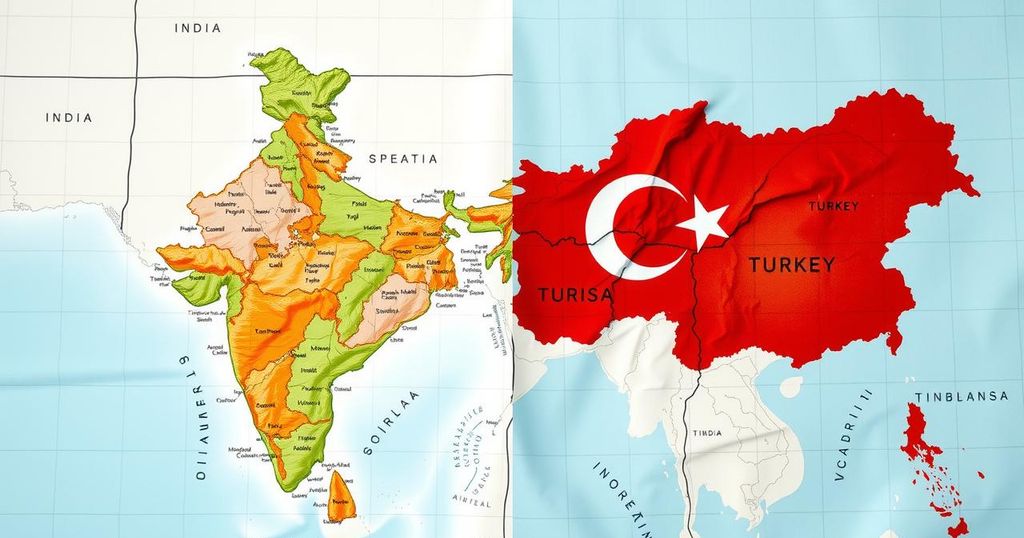Cars
ABDULLAH OCALAN, ASIA, CHIRANJEEVI, COLLABORATION, CURRENT EVENTS, CURRENT_AFFAIRS, EUROPE/ASIA, FORUM, IANS, INDIA, IRAN, IRAQ, MEGA, MICHAEL RUBIN, MIDDLE EAST, NEW DELHI, NI, NIZAMABAD, PAKISTAN, PAW, PAWAN KALYAN, PKK, PONT, PRIZES, RUBIN, SAMBARAALA YETIGATTU, SRINIVAS YADAV, SYRIA, TAL, TELANGANA, TERRORISM, TESLA, TURKEY, UK, UK PARLIAMENT, WORLD NEWS, YOGI MAN
Fatima Khan
0 Comments
Turkey’s Complicity in Terrorism: Insights from Expert Michael Rubin
In a recent interview, Middle East expert Michael Rubin discusses Turkey’s role as a state sponsor of terrorism, its relationship with Pakistan, and the implications for India. He emphasizes the need for India to adopt a more assertive diplomatic approach and consider support for the Kurdish movement as a counter to Turkey’s actions. Furthermore, Rubin notes a declining influence of Turkey in Western politics amidst increasing recognition of its support for terrorism.
In an insightful interview with IANS, Michael Rubin, a prominent Middle East scholar, scrutinizes Turkey’s geopolitical influence, particularly its collaboration with Pakistan and its connection to terrorism in Kashmir. As a senior fellow at the American Enterprise Institute, Rubin’s extensive experiences in various countries inform his analysis, particularly concerning Abdullah Ocalan’s role within the PKK and its implications for Turkey and the Kurdish movement.
Rubin elaborates on Abdullah Ocalan’s calls for the PKK to disarm, highlighting that Ocalan, imprisoned since 1999, has been isolated from direct control of the PKK. He argues that both the PKK’s leadership dynamics and its ongoing conflict with Turkey complicate any expectation for disarmament under Ocalan’s current influence. He draws parallels between Ocalan and Nelson Mandela, stressing the difference in political contexts following their imprisonments.
Regarding India’s regional interests, Rubin asserts that Turkey’s strengthening ties with Pakistan pose significant challenges. He posits that India could strategically support the Kurdish movement as a counterbalance, aligning with the rights of the Kurdish people while addressing the threat posed by Turkey to India’s sovereignty.
Rubin critiques President Recep Tayyip Erdogan’s governance, noting his transition from a perceived pragmatist to an ideologue deeply intertwined with Muslim Brotherhood ideals. He emphasizes Erdogan’s unwavering support for Islamist groups and his consistent backing of terrorism in Kashmir, suggesting that India’s response must be assertive and strategic to counteract Turkey’s hostile actions.
The dialogue extends to the West’s perspective on Turkey’s growing influence among Islamists. Rubin notes a lack of consensus between the U.S. and Europe regarding Turkey, with Congress increasingly skeptical of Erdogan’s regime and recognizing it as a state sponsor of terrorism. This shift in perception indicates a potential for future congressional actions to curb U.S. relations with Turkey, regardless of the presidency’s stance.
Michael Rubin’s analysis emphasizes the complex geopolitical dynamics involving Turkey’s ties with Pakistan and its role in supporting terrorism, particularly in relation to India. He advocates for a stronger Indian stance, including support for the Kurdish movement, as a means of counteracting Turkish aggression. Moreover, the evolving sentiment in Western political circles regarding Turkey suggests a growing acknowledgment of its terrorist sponsorship, potentially reshaping international relations with the country.
Original Source: www.thehansindia.com




Post Comment